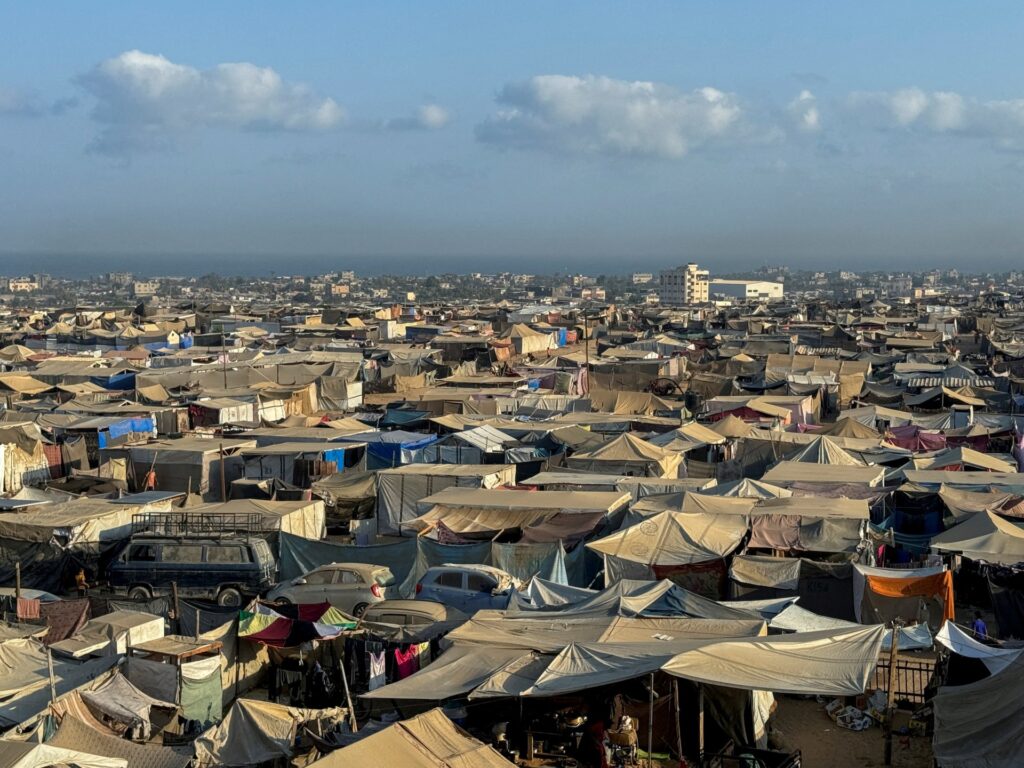10/9/2024–|Last update: 10/9/202403:14 PM (Makkah Time)
Israeli legal expert and Oslo Accords drafter Joel Singer warned of the heavy costs imposed on Israel by the occupation of the Gaza Strip, and called for a complete withdrawal from Gaza to avoid paying them.
Singer, who served as a legal adviser to previous governments, said in an article he wrote in Haaretz that Prime Minister Benjamin Netanyahu’s insistence on keeping control of the Philadelphi and Netzarim roads in Israeli hands on “the day after the war” indicates that he seeks Israeli military control over Gaza, regardless of whether an agreement is reached with the Islamic Resistance Movement (Hamas) and the Israeli army is evacuated, or not.
He added that this means that the entire area will remain occupied by Israel even if the Israeli army withdraws most of its forces from it, considering that “the legal test for considering the territories occupied or not is a realistic test, and depends on one question: Does the foreign army (the Israeli army in this case) have actual control over the territories or not?”
He stressed that from a legal point of view, “it is not necessary for the army itself to be present all the time in a certain territory in order for that territory to be considered occupied; rather, it is sufficient for the military force to control several strategic locations in or around the territory, and thus prevent any other military force from seizing it.”
“Once a territory is considered occupied, international law dealing with military occupation (or belligerent occupation, as the official legal term applies) will apply,” he said.
In this context, he referred to the Fourth Geneva Convention relative to the Protection of Civilian Persons in Time of War (1949), which focuses on the occupier’s obligation to restore public order and ensure the humanitarian needs of the civilian population in the occupied territories.
It is noteworthy that Israel has claimed since 1967 that because of its claim to sovereignty in the West Bank and Gaza Strip, the territories are not occupied and that the Geneva Convention does not apply to them. However, it has pledged to the international community to act in them in accordance with the humanitarian provisions of the Convention.
The Israeli expert touched on the contradiction between Netanyahu’s intention to maintain Israeli military control over Gaza, and Defense Minister Yoav Galant’s refusal to establish a military government there, when he said that “the Israeli military government in Gaza will become Israel’s main security effort in the coming years at the expense of other arenas. (This effort) will cost blood and victims and bring a heavy economic price.”
Hold the stick in the middle
Singer considered that there is a difference between the Israeli occupation of Lebanon in 1982 and the possibility of occupying Gaza, saying that the occupation army did not form a military government in the occupied Lebanese territories, “because the Lebanese government continued throughout this time to provide services to the population in the occupied territories without any interference or even encouragement from the Israeli army.” As for the case of the Gaza Strip, there is no legitimate government in Gaza today that can continue to provide services to the population, in his opinion.
The legal expert gave another example, Area B of the West Bank, where the Israeli army, according to the Oslo Accords, continued to control security, but withdrew the military government and transferred responsibility for civil affairs to the Palestinian Authority. “There is no law in Gaza like Area B in the West Bank, because of Netanyahu’s opposition to the Palestinian Authority entering Gaza,” he said, referring to his statement: “I am not prepared to replace Fatah with Hamas.”
He moved from this principle to say that Israel is entitled to withdraw if it wants to remove its legal responsibility for taking care of all the needs of the people of Gaza, including the responsibility for regular study in schools, rehabilitating hospitals, providing food, electricity, water, and so on.
“Israel must complete the full withdrawal from Gaza and not continue to control the Strip militarily, whether by maintaining control of the Philadelphi Corridor and Netzarim, or otherwise, and must emphasize that it is not obligated to care for the local population, as long as it does not interfere with other elements to do so,” he said.
He warned that if Israel wanted to maintain its military control over the Gaza Strip, it would have to deal with the civilian population there, in accordance with the Geneva Convention. Israel could do this by re-establishing the military government mechanism, or by finding a legitimate alternative willing to take responsibility for the treatment of the civilian population under Israel’s supreme military responsibility.
He concluded by saying, “Israel cannot hold the stick in the middle, and the government will not be able to bury its head in the sand. It will either maintain military control over the area, or withdraw and evade its legal responsibility to deal with the civilian population. If it continues with the current approach, this issue will reach the International Court of Justice in The Hague and will be on the American agenda.”



